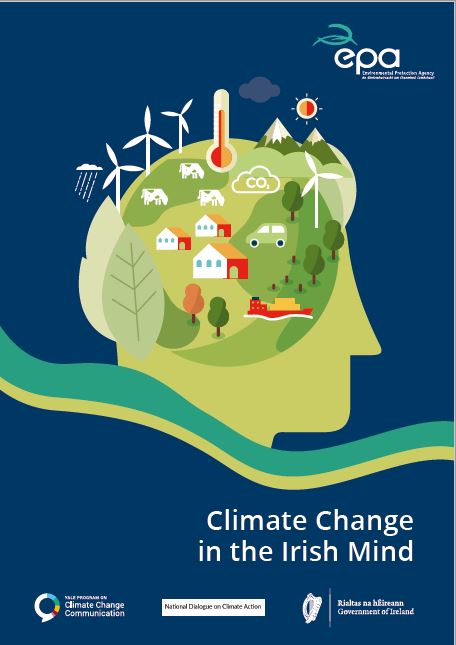People in Ireland support climate policies, with some opposition specific to local concerns and issues
- People in Ireland feel that ‘others’ – such as future generations or people far away – are more threatened by climate change than themselves in the here and now.
- This means that many people underestimate the immediate risks and already-occurring effects of climate change here in Ireland.
- The youngest adults (18-24 years) consistently exhibit significantly higher levels of concern, with young women most concerned about climate change.
- People in Ireland support climate change policies. Where opposition to climate policies arise, it appears to be driven by practical concerns, rather than by scepticism or suspicion of the science of climate change.
The Environmental Protection Agency (EPA) has published two insight reports from its ‘Climate Change in the Irish Mind’ study. The reports ‘Climate Change in the Irish Mind – Support for Climate Policies’ and ‘Climate Change in the Irish Mind – Climate Risk Perceptions’ provide a detailed examination of some of the findings of the baseline study published in 2021.
The insight reports show that despite high levels of concern among the Irish public about climate change and high levels of overall support for climate action, there is a sense that ‘others’, or people in other countries and people in the future, will be more impacted than Irish people in the here and now. The reality is that climate change is already having real and measurable impacts on people in Ireland, and this is likely to increase in the future without concerted action.
The reports also show that among a minority of people (on average 30 per cent) there is opposition to specific climate policies reflecting practical concerns such as the feasibility of electrifying home heating and transport.
Launching the reports, Dr. Eimear Cotter, Director of the EPA’s Office of Evidence & Assessment said:
“This assessment indicates that the majority of people in Ireland support climate policies. People who oppose climate policies are not, however, climate deniers and opposition does not appear to be reflective of underlying concerns or suspicions around climate change. Rather, it appears to be specific to localised concerns and issues which must be addressed to enact major climate change policies”.
She added,
“Today’s report also shows that there is an ‘othering’ or disconnection from the impacts of climate change. People believe that it will harm people in the future, far away, animals and plants, other people, and lastly themselves personally. This shows how important it is to convey the immediacy of the threat of climate change to people, that each of us is already being impacted by it and will be increasingly impacted into the future unless action is taken now”.
The Climate Change in the Irish Mind insight reports focus on the national responses to risk perceptions and policy support.
Speaking about the findings Dr. Conor Quinlan, Senior Manager in the Office of Evidence and Assessment said:
“Age is the biggest factor in determining how concerned people are about climate change. The youngest adults (18-24 years) consistently exhibit significantly higher levels of concern and risks perceptions in relation to climate, with young women disproportionately concerned about climate change. And unlike some groups, they act on these concerns: young people’s consumer choices and purchasing patterns reflect their perception of climate change as a major risk.”
The insight reports can be found on the EPA website Report 1 and Report 2.

People in Ireland support climate policies, with some opposition specific to local concerns and issues
Notes
The ‘Climate Change in the Irish Mind’ project is a baseline study of the Irish population’s beliefs, attitudes, policy preferences, and behaviours regarding climate change.
This work was undertaken by EPA and our academic partner Yale Program on Climate Change Communications (YPCCC) in support of the National Dialogue on Climate Action.
The data in this report are based on a representative survey of 4,000 residents of the Republic of Ireland, aged eighteen and older. The survey was conducted from the 24th of May to the 29th of July 2021.
All questionnaires were administered by call agents using computer-assisted telephone interviewing (CATI) software. The survey took, on average, 25 minutes to complete. Survey respondents were recruited using a random digit dial sample of live Irish telephone numbers. About 80% of survey respondents were reached through mobile phone numbers and 20% through landline phone numbers. A total of 84,961 numbers were dialled and 4,030 interviews were completed (including thirty pilot interviews to test survey wording and timing), for a response rate of 5%. Gender, age, work status, and region quotas were used to ensure sample representativeness. Key demographic variables were also weighted, post survey, to match Central Statistics Office norms.
Links to all Climate Change in the Irish Mind Study reports and tools
| Logo | Report | Infographic | Tool |
| Climate change in the Irish mind:
Main report |
Supporting Infographic | ||
| Climate Change’s Four Irelands
Population Segmentation Report |
Supporting Infographic | ||
| Climate Opinion Maps
CCIM Visualisation tool |